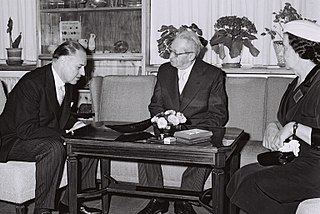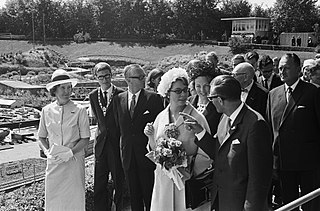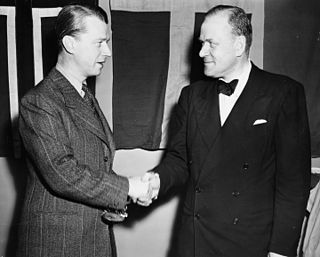Related Research Articles
Baron Israël Karl-Gustav "K-G" Eugène Lagerfelt was a Swedish diplomat.

Baron Göran Fredrik von Otter was a Swedish diplomat and friherre, best known for his service in Berlin during World War II. Birgitta and Anne Sofie von Otter are von Otter's daughters; former Swedish Prime Minister Fredrik von Otter was his grandfather.
Björn Axel Eyvind Bratt was a Swedish diplomat.
Nils-Eric Gustaf Ekblad was a Swedish diplomat.
Karl-Anders Ingvar Wollter was a Swedish diplomat.
Blenda Margareta Hegardt was a Swedish diplomat. She was Swedish consul general in Los Angeles from 1983 to 1989, ambassador in Dublin from 1989 to 1993 and consul general in Hamburg from 1993 to 1997.

Henrik Sven Hirdman, is a Swedish diplomat and ambassador.
Johan Fredrik Göstasson (Gson) Bergenstråhle was a Swedish diplomat.
Per Bengt Magnus Ingemar Rösiö was a Swedish diplomat and author. He served as Ambassador to 17 countries and authored 20 books, mainly on diplomacy. He is more widely known however for having conducted the Swedish government's inquiry into the death of the UN Secretary General Dag Hammarskjöld where he maintained that there was no foul play.
Åke Magnus Valdemar Sjölin was a Swedish diplomat.
Olov Arthur Ternström was a Swedish diplomat.

Jens Henrik Peder Arnold Malling was a Swedish diplomat. After finishing his university studies, Malling became an attaché at the Ministry for Foreign Affairs in 1938. He then served within the Swedish foreign service for over 30 years.
Sven Fredrik Hedin was a Swedish diplomat. Hedin joined the Ministry of Foreign Affairs in Stockholm as an attaché in 1949 and served the following 40 years in many countries, including as ambassador in Dar es Salaam, Buenos Aires and Rome.

Knut Richard Thyberg was a Swedish diplomat. He was Swedish envoy in Rio de Janeiro from 1949 to 1955, and ambassador in Lisbon from 1955 to 1959 and non-resident ambassador in Monrovia from 1958 to 1959.

Nils Hugo Withmar Tamm was a Swedish diplomat. Tamm served as Swedish consul general in Berlin 1953–1959 and ambassador in Israel 1960–1963 as well as ambassador in South Africa 1964–1966.

Carl Brynolf Julius Eng was a Swedish diplomat. He served as Swedish envoy and ambassador in a number of different countries between 1950 and 1975.

Karl Lennart Hjalmar Nylander was a Swedish diplomat.
Jean-Christophe Sébastien Öberg was a Swedish diplomat. He served in the Swedish foreign service for 30 years, as ambassador in Vietnam (1972–1974), in Thailand, Laos and Singapore (1976–1981), in Algeria (1982–1987) and in Poland (1987–1991).
Elis Ingemar Stjernberg, was a Swedish diplomat. Stjernberg began his career as an attaché at the Ministry for Foreign Affairs in 1962 and held several key diplomatic positions, including second secretary at the Swedish UN mission in New York City and first secretary in London. In 1982, he was appointed ambassador to Beirut and later to Amman, arriving in Lebanon during the volatile aftermath of the 1982 Lebanon War. Throughout the Lebanese Civil War, he coordinated the evacuation of Swedish citizens and remained involved in negotiations during the Lebanon hostage crisis. In 1990, Stjernberg was appointed envoy to Pretoria, where he became ambassador following the release of Nelson Mandela. From 1994 to 1998, he held significant roles within the Ministry for Foreign Affairs, overseeing relations with OSCE member states and coordinating EU-related technical assistance to candidate countries.
References
- 1 2 3 4 5 Jönsson, Lena, ed. (2000). Vem är det: svensk biografisk handbok. 2001 [Who is it: Swedish biographical handbook. 2001] (in Swedish). Stockholm: Norstedt. p. 685. ISBN 9172850426. SELIBR 8261515.
- ↑ Liljegren, H. (2006). From Tallinn to Turkey: As a Swede and Diplomat: Memoirs. Merkez Kitaplar. ISBN 978-975-9174-56-9.
- ↑ "Board of Directors". Atlantic Council. Retrieved 2024-04-16.